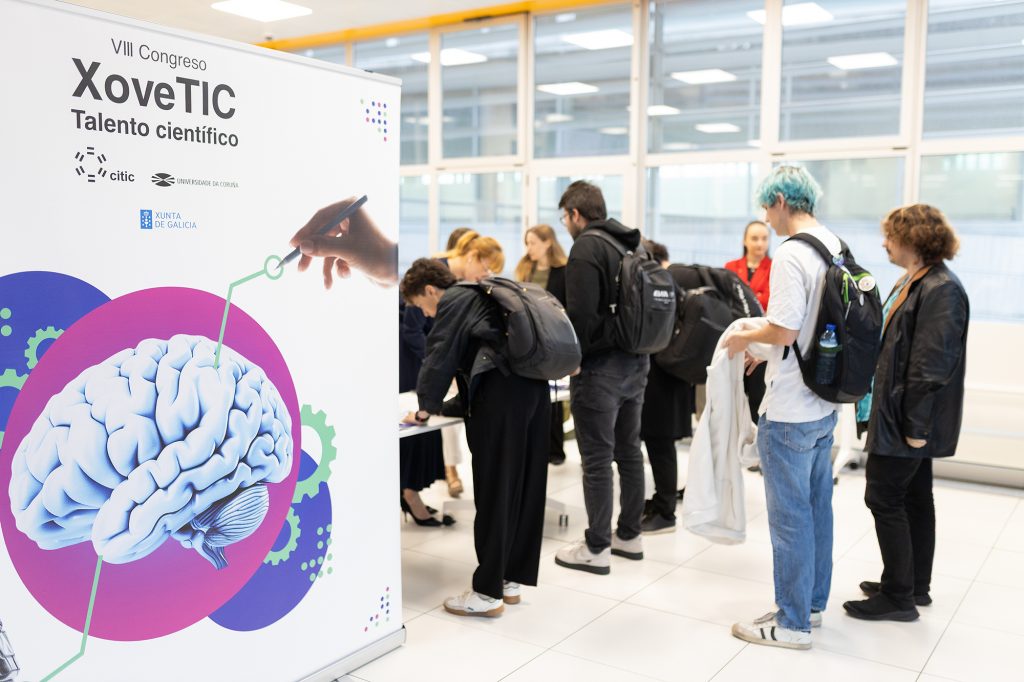
XoveTIC 2025 Congress brings together in A Coruña the talent shaping the digital future: AI, data and cybersecurity
- CITIC and the Faculty of Computer Science at the University of A Coruña are hosting, on 9 and 10 October, the eighth edition of this technology congress for young researchers, featuring 36 oral presentations and 23 posters.
- The event showcases research in fields such as deep learning and quantum machine learning, applied to medicine, biology, astronomy, and finance.
A Coruña, 9 October 2025.– Artificial intelligence speaks with a young voice in A Coruña. More than one hundred emerging researchers are meeting today and tomorrow at CITIC —a centre within the CIGUS Network— and the Faculty of Computer Science of the University of A Coruña to share the advances that will define the future of technology. In its eighth edition, supported by the Xunta de Galicia, the XoveTIC Congress consolidates its position as a key meeting point for university talent and Galician research centres, presenting projects that explore areas ranging from deep learning and quantum machine learning to the ethical and sustainable applications of AI.
The opening session featured Ricardo Cao Abad, Rector of the University of A Coruña; José Alberto Díez de Castro, Secretary General of Universities of the Xunta de Galicia; and Manuel G. Penedo, Director of CITIC. In addition, Diego Álvarez Estévez, CITIC researcher, delivered a keynote lecture on his outstanding research career.
The oral presentations and posters, held between Thursday and Friday at CITIC and the Faculty of Computer Science, cover a wide range of topics related to artificial intelligence, data science, and advanced computing. The works presented include research on deep learning and quantum machine learning applied to medicine, biology, astronomy, and finance. Other studies address developments in computer vision, georeferenced data analysis, and evaluation of strategies for large language models, reflecting the diversity and timeliness of research in the technology domain.
A significant part of the programme focuses on extended reality (virtual, augmented, and mixed) and its use in medical education, rehabilitation, surgery, and accessibility. Highlights include immersive simulation projects for the training of healthcare professionals, virtual environments for people with disabilities, and educational applications based on gamification. Several contributions also address ethical, environmental, and legal aspects associated with AI development, introducing reflections on so-called “green algorithms” and responsible decision-making in complex contexts.
The poster sessions complement the oral presentations with applied and experimental studies across diverse areas: incident and toxicity prediction, anomaly detection in water systems, livestock monitoring using RFID, communication security and blockchain, photovoltaic energy forecasting, and video game adaptation for people with disabilities. Together, these contributions demonstrate a strong commitment to interdisciplinarity, technology transfer, and the application of computer science research to real-world challenges in health, industry, environment, and society.
XoveTIC Awards
This edition will grant nine awards to the best-evaluated works based on their quality, excellence, and originality. Sponsored by various academic chairs and partner organisations, these awards recognise the most outstanding contributions in their respective areas.
Among them are the Cátedra R Award, recognising the most relevant work in the field of security, broadly understood —including cybersecurity in information and communication technologies as well as safety in other domains; the Cátedra Aldaba – WIB (Women, ICT & Business) Award, for the most notable work led by a woman as first author; the ITG–ARQA Award, for excellence in quantum technology; the CPEIG Award, for the best work authored by a student or graduate in Computer Engineering; the Cluster TIC Awards, for the best poster and best oral communication; the Fundación CITIC Award, for the most significant contribution in basic or theoretical research; and the Cátedra NTT Data Award, for the most outstanding work in diversity, social economy, and the promotion of equality.
A key addition this year is the Ilustre Colegio Provincial de Abogados de A Coruña – ICACOR Award, which seeks to recognise research that integrates ethical and legal perspectives in the development and application of ICT —an increasingly relevant area in both technological and social debate.
The full programme is available at: https://xovetic.citic.udc.es/programa/
About CITIC
CITIC is a research centre promoting excellence and progress in applied R&D&I in ICT. Established in 2008 by the University of A Coruña, its scientific activity is structured into four main research areas: Artificial Intelligence; Data Science and Engineering; High-Performance Computing; and Intelligent Services and Networks. A transversal area covers all of them: Cybersecurity.
CITIC is accredited as a Centre of Excellence and a member of the CIGUS Network for the 2024–2027 period, endorsing the quality and impact of its research. The accreditation, structure, and enhancement of CITIC are co-funded by the Xunta de Galicia and 60% by the European Union under the ERDF Galicia 2021–2027 Operational Programme, within the thematic objective of promoting “a smarter Europe: innovative and intelligent economic transformation” (ED431G 2023/01).





